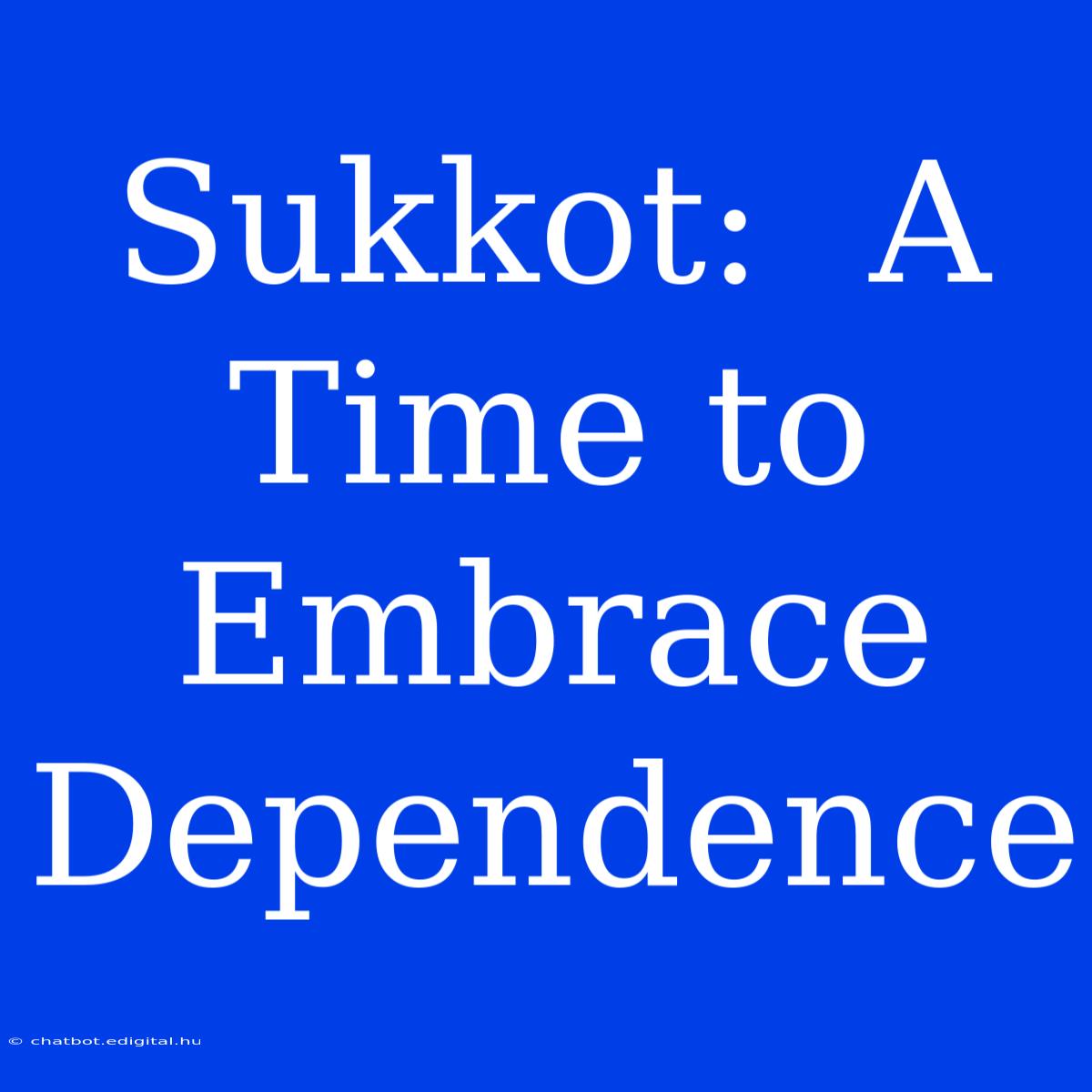Sukkot: A Time to Embrace Dependence
What is Sukkot and why is it a time to embrace dependence? Sukkot, the Jewish Festival of Tabernacles, is a week-long celebration that commemorates the Israelites' journey through the desert after their Exodus from Egypt. During this time, Jews build temporary shelters known as sukkahs and dwell in them for seven days. Sukkot serves as a powerful reminder of our dependence on God, a concept often overlooked in our fast-paced, independent-driven world.
Editor Note: This article explores the deeper meaning of Sukkot, showcasing how this holiday encourages us to reflect on our dependence on a higher power.
This holiday is an important read because it offers valuable lessons about letting go of control and relying on something greater than ourselves. Sukkot teaches us to acknowledge our vulnerabilities and find solace in the embrace of a higher power.
We dove deep into the historical, spiritual, and symbolic aspects of Sukkot to understand its message of dependence. We reviewed various Jewish texts and traditions, uncovering the multifaceted nature of this impactful holiday.
Key Takeaways of Sukkot:
| Aspect | Explanation |
|---|---|
| Dwelling in the Sukkah | A tangible symbol of vulnerability and dependence. |
| The Four Species | Representing different aspects of our relationship with God. |
| The Feasting and Hospitality | An expression of gratitude for God's provision and a reminder of our interconnectedness. |
| The "Ushpizin" | Welcoming the patriarchs as guests in the sukkah, highlighting the importance of community and welcoming those in need. |
Let's dive into the core aspects of Sukkot:
Dwelling in the Sukkah: The sukkah, a temporary dwelling made of natural materials, symbolizes our temporary nature and reliance on God's protection. By leaving the comfort of our homes and living in a fragile structure, we acknowledge our need for something beyond ourselves. The sukkah's exposed roof serves as a reminder of our vulnerability and dependence, mirroring the Israelites' journey through the desert where they were exposed to the elements and reliant on God's guidance.
The Four Species: The etrog, lulav, hadas, and aravah, known as the Four Species, are used during Sukkot rituals. These plants represent different aspects of our relationship with God: the etrog symbolizes the heart, lulav represents the spine, hadas signifies the eyes, and aravah embodies the mouth. Holding and waving these species during prayers symbolizes our commitment to connecting with God on all levels of our being.
The Feasting and Hospitality: Sukkot is also a time for feasting and celebration. The festival emphasizes the importance of hospitality and sharing with others. Sharing meals with friends and family, inviting guests into our sukkahs, and extending kindness to those in need are integral parts of the holiday. This aspect reinforces the concept of dependence, highlighting our shared reliance on each other and God's provision.
The "Ushpizin": A unique custom of Sukkot is the welcoming of the patriarchs – Abraham, Isaac, and Jacob – as guests in the sukkah. This tradition, known as "Ushpizin," reinforces the importance of welcoming strangers and those in need. It also reflects the concept of relying on the guidance and support of our ancestors and their legacy.
**In essence, Sukkot is a time to: **
- Acknowledge our vulnerability and dependence on a higher power.
- Recognize our need for community and support.
- Practice gratitude for God's provision and blessings.
- Extend kindness and hospitality to others.
FAQs About Sukkot:
Q: What is the significance of the "Ushpizin" tradition? A: Welcoming the patriarchs as guests in the sukkah symbolizes the importance of hospitality and welcoming those in need, highlighting our dependence on the guidance of our ancestors and the strength of our shared faith.
Q: Can anyone build a sukkah? A: Yes! Anyone can build a sukkah, regardless of their level of observance. It's a simple and meaningful way to connect with the holiday's themes.
Q: What are some traditional foods eaten during Sukkot? A: Traditional Sukkot foods include challah, fruits, and vegetables. The focus is on enjoying simple meals with family and friends.
Q: What is the difference between Sukkot and Shemini Atzeret? A: Shemini Atzeret marks the end of Sukkot and is a day of prayer and reflection. While it is not a part of the seven days of Sukkot, it is considered a continuation of the holiday.
Tips for Celebrating Sukkot:
- Build a Sukkah: Gather friends and family to create your own sukkah. Use natural materials and personalize your sukkah with decorations.
- Enjoy the Four Species: Learn about the symbolism of each species and participate in the waving ceremony.
- Share Meals: Prepare traditional Sukkot foods and invite loved ones to enjoy meals in your sukkah.
- Practice Hospitality: Welcome guests to your sukkah and share the joy of the holiday.
- Learn about the "Ushpizin": Read about this unique custom and invite the patriarchs into your sukkah.
Concluding Thoughts on Sukkot:
Sukkot is a time of joy, reflection, and growth. By embracing the holiday's message of dependence, we open ourselves to a deeper understanding of our relationship with God, our community, and ourselves. This holiday challenges us to step outside of our comfort zones, embrace vulnerability, and appreciate the blessings in our lives.
Sukkot reminds us that we are not meant to walk this path alone. It is a time to reconnect with our spiritual roots and strengthen our ties with our community, embracing the interconnectedness that makes life truly meaningful.

